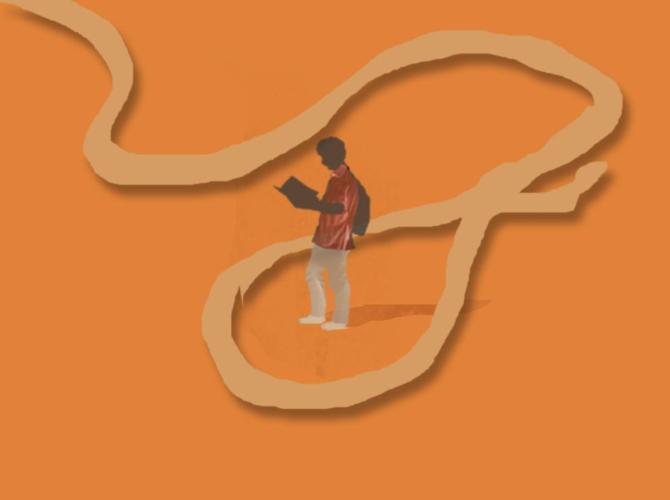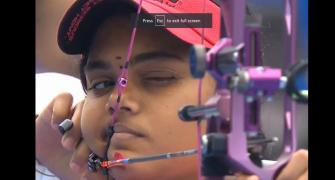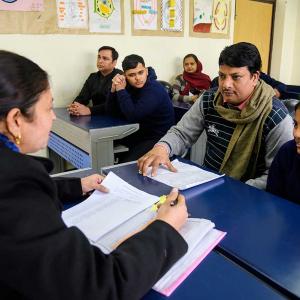The suicides have involved more NEET aspirants than JEE.
'It's a make-or-mar situation.'
'Either you get into a government medical college, where the fee is much lower than in private institutes, or you don't make it.'

On a hot afternoon, inside the main building of Allen Academy, the largest coaching institute in Kota, a large screen facing a row of seats for visitors shows a hapless Charlie Chaplin being fed unsuccessfully by a machine.
The clip from Modern Times is an indictment of blind mechanisation.
Such comic relief in the sombre setting escapes the notice of the thousands of preoccupied students who mechanically flit in and out of classrooms as they prepare to crack two of India's toughest academic tests -- the Indian Institute of Technology-Joint Entrance Examination (IIT-JEE) and the pre-medical National Eligibility cum Entrance Test (NEET).
Every year, more than 200,000 aspirants, the vast majority in Classes 11 and 12, head for Kota, 240 km south of Jaipur, in Rajasthan, making for a Rs 5,000 crore a year business.
They also enter a pressure cooker. The schedules are punishing and the pressure intense.
Struggling to cope, some turn to psychologists on campuses. Others internalise it. And some cannot take it anymore. Suicides by students are not uncommon.
This year, 24 have ended their lives in Kota -- the most in a year.
Allen, the largest coaching centre in the city, has a student strength of over 125,000 in Kota.
Classes are scattered across nine blocks bearing names such as Sankalp and Sabal that cry of resolve and fortitude.
Both are needed to cope with the gruelling schedule, which requires one to devote pretty much all waking hours to studying.
Thousands of teachers instruct two batches of more than five hours each -- one in the morning, the other in the evening.
Between classes, it is common to find the students seated in a hall for a 'self-study' session.
Everyone is bound by the rut of routine.
Krishna Prasad Patro, a Class 12 student from Berhampur in Odisha, says his parents have never pressured him.
He has a penchant for computer engineering and is eager to get into an IIT.
His mother has been staying with him for a few months, he says, adding that he is on medication for an anxiety disorder.
A batch mate of his, Rohit Raaj, harboured dreams of coming to the city when he watched the popular streaming series, Kota Factory, four years ago at his home in Dhanbad, Jharkhand.
Asked about the learning experience in Kota, Patro mentions the classification at coaching centres of "rankers", who score top marks consistently, and "bankers", who are the stragglers.
The best teachers cater to the "star batches", but students are allowed to approach counsellors and seek a change of instructor.
"For me," he says, "it does create a sense of competition, but many believe the rankers are more privileged."
In such a setting, students usually end up becoming more of foes than friends, each trying to outdo the other.
But how do they look at the suicides?
"It is mainly a result of parental pressure, but sometimes children also carry a sense of guilt if they are unable to prove themselves," says Raaj, who has sought counselling from a psychologist on campus, though he says he does not face family pressure.
The psychologist impressed upon him the importance of a good sleep cycle, which he was unable to settle into in the first year.
Prachi Rajput, from Faridabad, Haryana, says she sleeps four to six hours on a given day. She also dances once a week.
In the past two months, the institutes have introduced a 'fun zone' after classes once a week as successive suicides invited media scrutiny.
However, for someone such as Rajput, that is all the downtime they get in a whole week.
Are students crippled with the fear of failure?
"Parents worry when our marks in the internal assessments are low," says Rajput. "But by now, I have gained enough confidence to clear exams for a railway or police job."
The suicides have stirred the state government and others, sometimes in a knee-jerk manner.
Hostels and paying guest accommodations -- many of them leased by local landowners to individuals who reside elsewhere -- have now resorted to installing spring-loaded ceiling fans as a deterrence.
In August, the district administration ordered a two-month pause on tests and exams carried out by coaching centres.
Posters of a recent performance by a rock band, organised by the local hostel association, stick out as an attempt to entertain jaded minds.
A spokesperson for Allen says the academy is expanding its team of 62 professionals for psychological support, which includes 32 psychologists and counsellors, to 150 by the end of this month.
Its student helpline receives at least 100 calls a day.
"In our experience, the key reasons for this extreme step (suicide) by students include relationship issues, family conflicts, academic stress and personality disorders," the spokesperson for Allen says.
The newest entrants to the burgeoning coaching ecosystem in Kota include edtech companies that made a foray after COVID-19.
One of them, Physics Wallah, says that besides professional counselling and peer support programmes for students, it urges teachers to be vigilant and report signs of distress.
"We take strong measures to ensure students have an easier set-up during exams," says Ankit Gupta, CEO, Physics Wallah Offline.
"These include clear instructions, simplified question papers, and minimising any factor that could contribute to anxiety."
The Kota story began when V K Bansal, a chemical engineer, took to tutoring a few students four decades ago after he was diagnosed with muscular dystrophy.
In 1991, he started Bansal Classes. Bansal died in 2021, but what he started grew into an industry with which Kota has come to be identified.
Ironically, though, Bansal Classes has now been literally put in the shade by larger academies. Its officials maintain that, unlike other coaching centres, Bansal Classes admits only those with the "right aptitude".
"In the beginning, coaching institutes would take in students only after admission tests, but now they have become commercial and business-centric," says a Bansal spokesperson, adding that factors contributing to mental stress and suicides include family and societal pressure, comparison with peers, and a hectic routine.
As a remedy, Bansal Classes suggests a re-evaluation of the JEE/NEET syllabi to excise irrelevant or less important topics, a weekly off for students, better monitoring of attendance in hostels, psychometric analysis of students, and an attempt to highlight alumni who may have failed to clear JEE/NEET but lead successful lives.
The Kota police has a team of 11 personnel who engage with students at hangouts and sensitises other stakeholders.
Chandrasheel Kumar, the additional superintendent of police in charge of this team, says they communicate regularly with students and their parents.
Most of the students are from middle-income homes, though some are from lower-income families.
In two months, Kumar's team has received 315 complaints.
"Only 25 or 30 cases were related to stress or depression, and five-six were acute," Kumar says.
The suicides have involved more NEET aspirants than JEE.
"It's a make-or-mar situation. Either you get into a government medical college, where the fee is much lower than in private institutes, or you don't make it."
Parents add to this pressure.
The Kota factory clearly calls for more than a mechanical repair.
Meantime, some parents choose to stay with their children to ease the pressure on them.
Reena Tomar, a computer teacher from Narmadapuram, Madhya Pradesh, left for Kota a year ago with her son. Since then, mother and son have been living here in a two-room flat.
"My son stays home when he is not in school. Even if he wants a pen, I step out to buy it. Children need all the time to prepare," says Tomar.
It can be argued whether that puts more pressure on her son or less.

Feature Presentation: Ashish Narsale/Rediff.com










